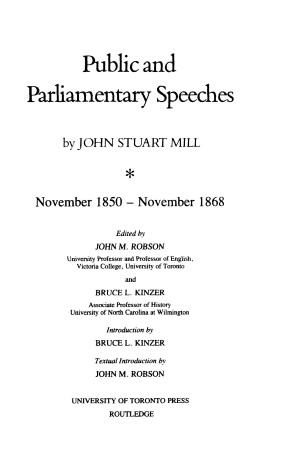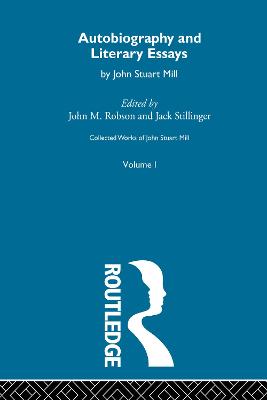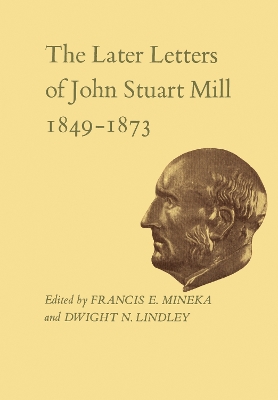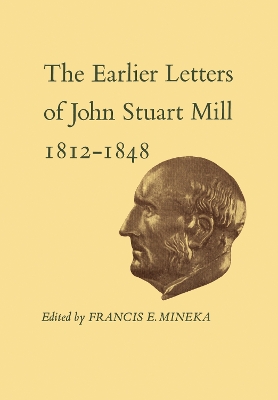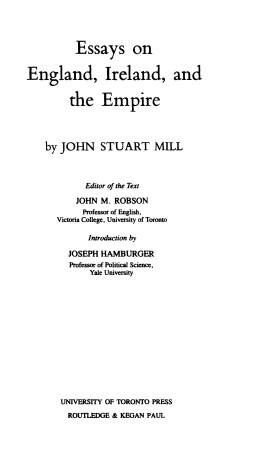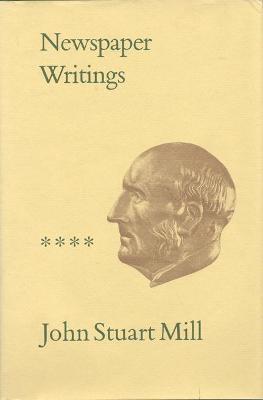Collected Works of John Stuart Mill
4 primary works • 13 total works
Book 9
Alan Ryan's analytical and historial introduction dwells on the most significant philosophical elements in the work, placing them in perspective and showing their relations to other aspects of Mill's thought. The textual introduction, by John M. Robson, examines the treatise in context of Mill's life in the 1860s, outlines its composition, and discusses, among other matters, the importance of the extensive revisions Mill made, mostly in response to critics. These revisions appear in full in the textual apparatus. Also provided are a bibliographical index, which gives a guide to the literature on the subject, and a collation of Mill's quotations, an analytical index, and appendices giving the reading of manuscript fragments and listing textual emendations.
Book 20
This volume brings together for the first time the essays, running from 1826 to 1849, that meld these abiding interests. They give as well insights into Mill's personal aspirations, his developing view of comparative politics and sociology, his concern for freedom, and his feminism. During these years Mill worked on a published his System of Logic, Book VI of which shows in condensed form the results of the speculations here developed; reading these essays with that work, which made his reputation as a philosopher, enables one to see the effects of romanticism on analytic thought in a way not as clearly evident even in Mill's Autobiography. Independently important, then, the essays in this volume also enable us to interpret anew the practical and theoretical concerns fundamental to his formative years and maturity. John C. Cairns' Introduction demonstrates how the essays reveal, through their reactions to the Revolutions of 1789, 1830, and 1848, and to French historiography, politics, and thought, the effect of France on Mill's ideas, and also the way in which his other concerns influenced his reactions to France.
The texts, with the variants and notes that are the hallmark of this edition, are described in John M. Robson's Textual Introduction, which explains the editorial principles and methods.
XXX
Book 31
The interests and activities of John Stuart Mill (1806-73) were so wide-ranging that even the varied subjects of thirty previously published volumes of Collected Works cannot encompass them all. In this volume are brought together diverse and interesting instances of his polymathic career, none before republished and some previously...
Read moreThe interests and activities of John Stuart Mill (1806-73) were so wide-ranging that even the varied subjects of thirty previously published volumes of Collected Works cannot encompass them all. In this volume are brought together diverse and interesting instances of his polymathic career, none before republished and some previously unpublished.
Neatly framing Mill's writing career are his editorial prefaces and extensive notes to Jeremy Bentham;s Rationale of Judicial Evidence (1827) and James Mill's Analysis of the Phenomena of the Human Mind (1869). Both demonstrate his extraordinary powers of mind and diligence as well as his fealty. His constant avocation, field botany, is shown in his botanical writings, which open a window on an almost unknown activity that sustained and delighted him. Brief comments on two medical works hint at another interest. Two articles of which he was co-author demonstrate his work as editor of the London and Westminster Review, and a calendar of his contributions to the Political Economy Club provides yet another glimpse into his chosen activities and concerns. Published for the first time are Mill's English and French wills, providing still further biographical detail.
Mill's contributions to philosophy, economics, and history, and in the roles of scholar, politician and journalist can...Read more
Mill's contributions to philosophy, economics, and history, and in the roles of scholar, politician and journalist can hardly be overstated and this edition remains the only reliable version of the full range of Mill's writings. Each volume contains extensive notes, a new introduction and an index.
Many of the volumes have been unavailable for some time, but the Works are now again available, both as a complete set and as individual volumes.
Public and Parliamentary Speeches
by John Stuart Mill, John M. Robson, and Bruce L. Kinzer
Other appendices give variant readings from the Gomperz leters, a finding list of form letters signed by Mill in the India Office Library and Records, an index of correspondents represented in this volume, an index of persons and works cited in the letters, and an analytical index.
The Collected Works of John Stuart Mill took thirty years to complete and is acknowledged as the definitive edition of J.S. Mill and as one of the finest works editions ever completed.
Mill's contributions to philosophy, economics, and history, and in the roles of scholar, politician and journalist can...
The Collected Works of John Stuart Mill took thirty years to complete and is acknowledged as the definitive edition of J.S. Mill and as one of the finest works editions ever completed.
Mill's contributions to philosophy, economics, and history, and in the roles of scholar, politician and journalist can hardly be overstated and this edition remains the only reliable version of the full range of Mill's writings. Each volume contains extensive notes, a new introduction and an index.
Many of the volumes have been unavailable for some time, but the Works are now again available, both as a complete set and as individual volumes.
The Introduction by Ann Robson sets the items in their historical and personal perspective, and draws out the implications for Mill's life and thought. The Textual Introduction by John Robson gives an account of the sources of the texts, and lays out principles and methods followed in the editing.The Mill that emerges from these pages is a fighting journalist, uinhibited, forthright, and often brilliantly satirical, testing his theoretical opinions in the real world, gradually maturing and developing a practical philosophy whose influence has been felt well into our own time.





